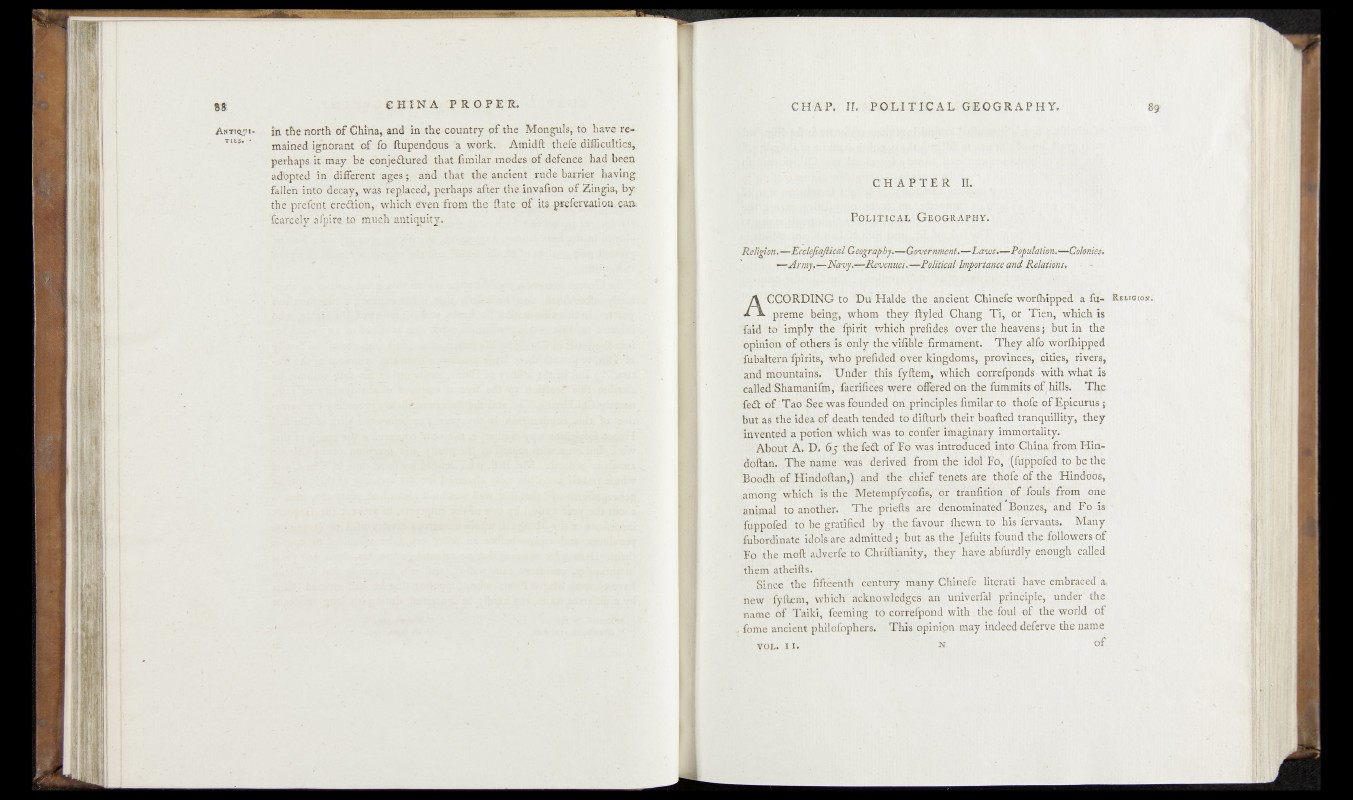
Antiquities
*
in tfie north of China, and in the country of the Monguls; to have re--
maimed ignorant of fo ftupendous a york. Amidft th^e diffieriMes^
perhaps it may be conje&ured that fimilar modes of defence had heed
adopted in different ages; and that the ancientynde barrier haying
fallen into decay-, was replaced, perhaps after the invafion of Zi.ngis, by
the prefent ereftion,. which even from the , flate of its. prefei vatilfii caa:
fcar.cely afpire- fcn much' antiquity:»
C H A P T E R II.
Political -O'E-oo-BfAPHy.
Religion.—Ecclefiajlical Geography.—government.—IJaivs-.—Population.—Colonies-.
—Arm^.fr-Mavy.—Revenues. diticahImportan.ee and Relations. ■
ACCORDING to Du Halde' 'ffiei-ahcienf Ghin&fe'^worijhiplpeif a fu-
preme being, whom they ‘ ftyledllChahg^ dr’ which is
faid to* imply the ‘ Tpiri't which |pj5éffdes„ipyei,|hê heavens; but in the
'opinion of others is 'only the vifible firmament. They alfo" worfhjpped
ffubaltern‘fplrits, Who ^r^fided. over .igjigdpms, p’roymces,'jcifiesr rivers,
fahd' irio’üntaha&.' ’ Under this iyftem, yhich .cprxefpphds with what is
called‘Shamanifm, fifcrificeswere offered on the fumrnits of jhills. The
fe£t of Tao Sèejwas foiinded on principles^i'uiilar to- thoipor Epicurus*;
but Ss the idea of death tended (d^ifturb tfyéir bqafted tranquillity, they
invented a potion which was to confer imaginary immèrfa^ity.^/
: Abdfi’t A. D. 65 thefedt of To was introduced'into ,Oïipa !frbm Hiri-
doftkn. The name wall derived from tÜe^idril To, Jfóppdfedto‘ble‘'lhe
‘Boodh of Hindoftan,) aiid fhe chief tenets are Wrae^qf the Hindoos,
among which? isHhe Metèmjff^Gqiis, 'px tranfitipffrif jfqii^r from one
arum a 1 tb another! The?'.priéffs aïë "’denotn'inated Bonzes, and
funpofed ! tQ be gratified J^y Ahe faymr f&evyhJ& ierVant's, Many
Subordinateulph^are admitted; but as the the foll^ers.of
'Fo the moft adverfe to Chriffianity, they have abfurdly enough p alled
.them athèifts.
' Since the fifteenth century many Ghinefe literati have embraced a,
new fyffem, which acknowledges an univerfal principle, under'-the
name o f Taiki, feeming to correfpond with the foul of the world -.of
fofne ancient philofophers.' This opinipn may indeed deferve the name
M.-Voni .11. - ’ N of
Religion.'